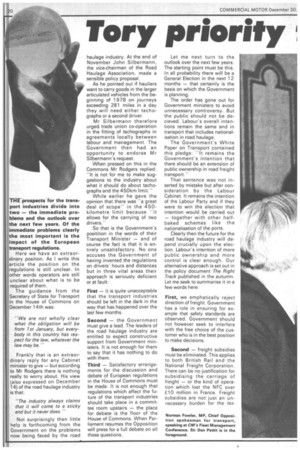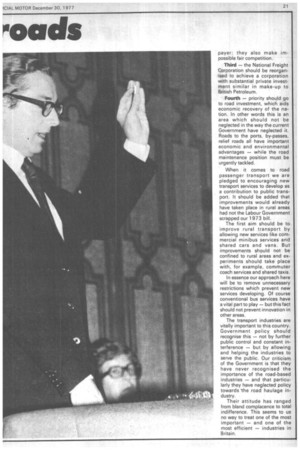Tory priority vads
Page 22

Page 23

If you've noticed an error in this article please click here to report it so we can fix it.
THE prospectsfor the transport industries divide into two — the immediate problems and the outlook over the next few years. Of the immediate problems clearly the most important is the impact of the European transport regulations.
Here we have an extraordinary position. As I write this article the position on the regulations is still unclear. In other words operators are still unclear about what is to be required of them.
The guidance from the Secretary of State for Transport in the House of Commons on December 14th was: "We are not wholly clear what the obligation will be from 1st January, but everybody in this country has respect for the law, whatever the law may be."
Frankly that is an extraordinary reply for any Cabinet minister to give — but according to Mr Rodgers there is nothing really to worry about. His view also expressed on December 14) of the road haulage industry is that:
The industry always claims that it will come to a sticky end but it never does."
Not surprisingly then little help is forthcoming from the Government on the problems now being faced by the road haulage industry. At the end of November John Silbermann, the vice-chairman of the Road Haulage Association, made a sensible policy proposal.
As he pointed out if hauliers want to carry goods in the larger articulated vehicles from the beginning of 1978 on journeys exceeding 281 miles in a day they will need either tachographs or a second driver.
Mr Silbermann therefore urged. trade union co-operation in the fitting of tachographs in agreements locally between labour and management. The Government then had, an opportunity to endorse Mr Silbermann's request.
When pressed on this in the Commons Mr Rodgers replied: "It is not for me to make suggestions to the industry about what it should do about tachographs and the 450km limit."
While earlier he gave the opinion that there was "a great
deal of scope" in the 450kilometre limit because "it allows for the carrying of two drivers.
So that is the Government's positition in the words of their Transport Minister — and of course the fact is that it is entirely unsatisfactory. No one accuses the Government of having invented the regulations on drivers hours and distances but in three vital areas their approach is seriously deficient or at fault: First — it is quite unacceptable that the transport industries should be left in the dark in the way that has happened over the last few months.
Second — the Government must give a lead. The leaders of the road haulage industry are entitled to expect constructive support from Government ministers. It is not enough for them to say that it has nothing to do with them.
Third — Satisfactory arrangements for the discussion and debate of European regulations in the House of Commons must be made. It is not enough that regulations which affect the future of the transport industries should take place in a commit:tee room upstairs — the place for debate is the floor of the House of Commons. When Parliament resumes the Opposition will press for a full debate on all these questions.
Let me next turn to the outlook over the next few years.
The starting point must be this. In all probability there will be a General Election in the next 1 2 months — that certainly is the basis on which the Government is planning.
The order has gone out for Government ministers to avoid unnecessary controversy. But the public should not be decieved. Labour's overall inten tions remain the same and in transport that includes nationalisation in road haulage.
The Government's White Paper on Transport contained this pledge: "It remains the Government's intention that there should be an extension of public ownership in road freight transport."
That sentence was not inserted by mistake but after con sideration by the Labour Cabinet. It remains the intention of the Labour Party and if they were to win the election that intention would be carried out — together with other halfbaked schemes like the nationalisation of the ports.
Clearly then the future for the road haulage industry will de pend crucially upon the elec tion. Labour's intention of more public ownership and more control is clear enough. Our alternative approach is set out in the policy document The Right Track published in the autumn. Let me seek to summarise it in a few words here: First, we emphatically reject direction of freight. Government has a role in ensuring for example that safety standards are observed. Government should not however seek to interfere with the free choice of the customer who is in the best position to make decisions.
Second — freight subsidies must be eliminated. This applies to both British Rail and the National Freight Corporation. There can be no justification for subsidising the carriage of freight — or the kind of operation which lost the NFC over £10 million in France. Freight subsidies are not just an unnecessary burden for the tax
payer; they also make impossible fair competition.
Third — the National Freight Corporation should be reorganised to achieve a corporation with substantial private investment similar in make-up to British Petroleum.
Fourth — priority should go to road investment, which aids economic recovery of the nation. In other words this is an area which should not be neglected in the way the current Government have neglected it. Roads to the ports, by-passes, relief roads all have important economic and environmental advantages — while the road maintenance position must be urgently tackled.
When it comes to road passenger transport we are pledged to encouraging new transport services to develop as a contribution to public trans port. It should be added that improvements would already have taken place in rural areas had not the Labour Government scrapped our 1973 bill.
The first aim should be to improve rural transport by allowing new services like commercial minibus services and shared cars and vans. But improvements should not be confined to rural areas and experiments should take place with, for example, commuter coach services and shared taxis.
In essence our approach here will be to remove unnecessary restrictions which prevent new services developing. Of course conventional bus services have a vital part to play — but this fact should not prevent innovation in other areas.
The transport industries are vitally important to this country. Government policy should recognise this — not by further public control and constant interference — but by allowing and helping the industries to serve the public. Our criticism. of the Government is that they have never recognised the importance of the road-based industries — and that particularly they have neglected policy towards The road haulage industry.
Their attitude has ranged from bland complacence to total indifference. This seems to us no way to treat one of the most important — and one of the most efficient — industries in Britain.




























































